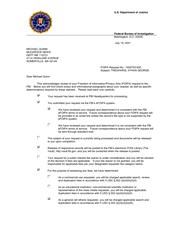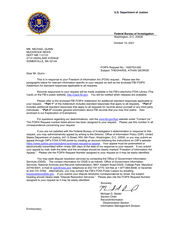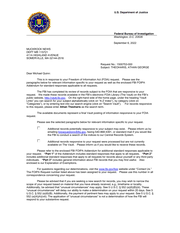Athan George Theoharis
| Tracking # |
1500753-000 |
| Submitted | July 11, 2021 |
MuckRock users can file, duplicate, track, and share public records requests like this one. Learn more.
Communications
From: Michael Quinn
To Whom It May Concern:
Pursuant to the Freedom of Information Act, I hereby request the following records:
1) FBI file on Athan George Theoharis (August 3, 1936 – July 3, 2021)
2) records, including all cross-referenced records, maintained on/mentioning Athan George Theoharis (August 3, 1936 – July 3, 2021)
Proof of death can be found here: https://www.nytimes.com/2021/07/10/us/politics/athan-theoharis-dead.html
In addition to standard practices, please conduct:
- Searches of the Electronic Case File System (ECF)
- Searches of Special Agent in Charge (SAC) safes, including searches for materials marked/noted as formerly having been in a SAC safe during any requested time-period specified in this request
- Searches of SENTINEL
- Searches of Electronic Surveillance (ELSUR) Indices, the Microphone Surveillance (MISUR) Indices, the Physical Surveillance (FISUR) Indices, and the Technical Surveillance (TESUR) Indices
- Searches of the Investigative Data Warehouse (IDW), including IDW-S, SPT, and DOCLAB-S sub-systems/indices
- Searches of the Data Integration and Visualization System (DIVS)
- Searches of the Law Enforcement National Data Exchange (N-DEx)
- Searches of the Counterdrug Information Indices System (CIIS)
I request all cross-referenced records be provided. If any responsive or cross-referenced records have been destroyed and/or transferred to NARA, please provide all records related/pursuant to their destruction/transfer. This includes but is not limited to:
- Confirmation of destruction and destruction slips
- File Numbers or other forms of ID of the aforementioned destroyed records
- Documents/records with any references to the destruction of the aforementioned destroyed records.
- Transfer slips
- Any other documentation relating to, mentioning or describing said transfer or destruction, to include but not be limited to confirmation that the Bureau has no other copies of said records
I want **ALL** records identifiable with this request, even though reports based on those records may have been sent to department headquarters or other department offices, and even though there may be duplication between sets of files. Please produce all records with their administrative markings intact, and all reports, memos, and documents to include any and all administrative pages. In any responsive material, please black out rather than white out or cut out material.
I request the administrative case file (including search slips and processing notes, i.e email correspondence and text messages) for this request. When searching email records, please search for any tracking information/identification assigned to this request, including but not limited to appeal number/ID, request number/ID, tracking number/ID, etc.
This part of the request is to be processed only after you have completed processing all of the above parts. This part does not request that you create any new record; rather, it requests the records that you will have created in processing the above parts, and will therefore exist before you conduct the search for this part. See McGehee v. CIA, 697 F. 2d 1095, 1100-05 (D.C. Cir. 1983) (agency must use time-of-search cut-off date, not time-of-request).
Wherever possible, please release responsive documents as individual files. Compiling all responsive documents into a single PDF reduces accessibility and ease of use, providing unnecessary complication.
I am additionally requesting for interim releases of responsive records (otherwise known as a "rolling release"). Please provide preprocessed pages initially and other material on a rolling release.
**I ask that you understand that I am requesting any and all records concerning the subject in any way, including but not limited to those listed in the General Index, those searched via your records department's standard practices and any and all other indexes.**
**Please understand that this request asks for full searches to be conducted, and that any preprocessed records/records hosted on your agency's reading room are not sufficient for my needs.** If you need approval from the requester to conduct further searches after providing preprocessed records/linking to your agency's reading room, consider this approval to do so.
BACKGROUND
Athan George Theoharis (August 3, 1936 – July 3, 2021) was an American historian, professor of history at Marquette University in Milwaukee, Wisconsin. As well as his extensive teaching career, he was noteworthy as an expert on the Federal Bureau of Investigation, J. Edgar Hoover, and U.S. intelligence agencies, having written and edited many books on these and related subjects.
Born in Milwaukee on August 3, 1936 to parents who were Greek immigrants, Theoharis earned all of his degrees from the University of Chicago: two bachelor's degrees in political science in 1956 and 1957, a master's degree in 1958 and his Ph.D. in history in 1965. He has taught at Texas A&M University, Wayne State University, City University of New York, State University of New York at Buffalo, and at Marquette University. The scope of his writings has extended to Cold War history, anti-communism in America, civil rights and the politics of government secrecy. He died on July 3, 2021 in Syracuse, New York from pneumonia.
Theoharis's first book was Anatomy of Anti-Communism (1969), which was quickly followed with the publication of his revised PhD dissertation, directed under the supervision of Walter Johnson, titled The Yalta Myths: An Issue in U.S. Politics, 1945–1955 (1970). The book explored the changing symbolism of the Yalta Conference and how it affected the domestic politics of both the Republican and Democratic Parties.
This was followed by his influential Seeds of Repression: Harry S. Truman and the Origins of McCarthyism (1971), and his influential article "Roosevelt and Truman on Yalta: The Origins of the Cold War" in Political Science Quarterly (1972). The former located the origins of so-called McCarthyism not with the junior senator from Wisconsin but with the context of the Cold War and President Harry Truman's flawed leadership and anti-Communist rhetoric which created a climate permitting the advent of the phenomenon of McCarthyism. The article highlighted Truman's role in determining, in part, the way in which the Cold War materialized.
In the mid-1970s, because of his work exploring the Truman and Eisenhower loyalty and security programs as well as his articles on FBI wiretapping, Theoharis was asked by the Church Committee to conduct research at presidential libraries. The Church Committee - the Senate select committee to study governmental operations with respect to intelligence activities - was formed by Senator Frank Church after Nixon administration, FBI, and CIA abuses became public. First without and then with qualified security clearances, Theoharis examined some presidential records relating to the FBI and White House at the Eisenhower, Kennedy, and Johnson presidential libraries. He also examined some FBI records for the Church Committee at FBI headquarters.
Following this work, and changes made to the Freedom of Information Act in the 1970s, in 1976 Theoharis became a specialist in the history of the FBI. He focused on FBI records procedures, rather than individual FBI targets, leading to discoveries or further understandings of the complexities and uses of FBI office files (as opposed to "official" FBI files), the JUNE mail file, the National Security Electronic Surveillance Index Card File, Surreptitious Entries file, COMPIC file, and COMRAP file.
His work has led some of his graduate students also to embark on FBI research. Two of his former PhD students include Kenneth O'Reilly (FBI and HUAC) and Christopher Gerard (FBI and the Senate Internal Security Subcommittee). Several of his master's students also studied the FBI with him while taking PhDs elsewhere: David Williams (PhD, University of New Hampshire) studied the early history of the FBI; Francis MacDonnell (PhD, Harvard University) studied the FBI and the Fifth Column; Douglas M. Charles (PhD, University of Edinburgh) studied the FBI and the anti-interventionist movement of 1939–45, and the FBI's Obscene File. Charles R. Gallagher, S.J. (Boston College) credits Theoharis with inspiring an integration of FBI and intelligence sources into the study of Vatican diplomatic relations.
The requested documents will be made available to the general public, and this request is not being made for commercial purposes.
In the event that there are fees, I would be grateful if you would inform me of the total charges in advance of fulfilling my request. I would prefer the request filled electronically, by e-mail attachment if available or CD-ROM if not.
Thank you in advance for your anticipated cooperation in this matter. I look forward to receiving your response to this request within 20 business days, as the statute requires.
Sincerely,
Michael Quinn
From: Federal Bureau of Investigation
There are eFOIA files available for you to download.
From: Muckrock Staff
To Whom It May Concern:
I wanted to follow up on the following Freedom of Information Act request, copied below, and originally submitted on July 11, 2021. Please let me know when I can expect to receive a response. You had assigned it reference number #1500753-000.
Thanks for your help, and let me know if further clarification is needed.
From: Federal Bureau of Investigation
Thank you for contacting foipaquestions@fbi.gov. Please check the status of your FOIPA Request at http://vault.fbi.gov by clicking on “Check Status of Your FOI/PA Request” on the right side of the page, and follow the instructions below.
Check the Status of Your FOIPA Request
If your FOIPA Number is [1234567-0] please enter [1234567-000] into the system. If your FOIPA Number is [1234567-1] please enter [1234567-001] into the system. If you have any questions about the status of your FOIPA request, please e-mail foipaquestions@fbi.gov.
FIND STATUS OF FOIPA- Request statuses are updated weekly
Please enter the whole FOIPA number-Example: [1234567-000]
FOIPA:
Results will show the Request Number, Case Type and Process Description shown below:
FOIPA:
1234567-000
Case Type:
FOIPA
Process Description (Will display the current progress of the request)
The FBI’s FOIPA Program is searching the FBI’s indices for potentially responsive documents.
You may be contacted via formal letter for all fees and/or negotiation issues that may apply.
NOTE: Recent requests are entered into the FOIPA database in the order that they are received. Before you can check the status, you must have received correspondence assigning a FOIPA request number and the information transferred to the online database. Status information is updated weekly. If a request has been closed within the last six months the online database will display the following: The FOIPA number entered has been closed, and appropriate correspondence has been sent to the address on file.
Estimated Dates of Completion
Requests are processed in the order in which they are received through our multi-track processing system. Requests are divided into two primary tracks--simple (under 50 pages of potentially responsive documents) and complex (over 50 pages of potentially responsive documents). Complex requests are further divided into medium, large, and extra-large sub-tracks based upon request size. Simple track requests typically require the least amount of time to process. Currently, simple track cases average approximately 152 days from the date of receipt for processing. Our complex requests in the medium processing track are currently averaging 922 days, large processing track are currently averaging approximately 1,964 days, and extra-large processing track are currently averaging 2,360 days for processing.
Respectfully,
Public Information Officer
FBI - Information Management Division
200 Constitution Drive
Winchester, VA 22602
O: (540) 868-4593
E: foipaquestions@fbi.gov<mailto:foipaquestions@fbi.gov>
Do you have further questions about the FOI/PA process? Visit us at http://www.fbi.gov/foia
Please check the status of your request online at https://vault.fbi.gov/fdps-1/@@search-fdps Status updates are performed on a weekly basis.
Note: This is a non-emergency email address. If this is an emergency, please call 911 directly. If you need to report a tip for immediate action, please contact FBI Tips at http://tips.fbi.gov/ or reach out to your local field office.
From: Federal Bureau of Investigation
There are eFOIA files available for you to download.
From: Muckrock Staff
To Whom It May Concern:
I wanted to follow up on the following Freedom of Information Act request, copied below, and originally submitted on July 11, 2021. Please let me know when I can expect to receive a response. You had assigned it reference number #1500753-000.
Thanks for your help, and let me know if further clarification is needed.
From: Muckrock Staff
To Whom It May Concern:
I wanted to follow up on the following Freedom of Information Act request, copied below, and originally submitted on July 11, 2021. Please let me know when I can expect to receive a response. You had assigned it reference number #1500753-000.
Thanks for your help, and let me know if further clarification is needed.
From: Muckrock Staff
To Whom It May Concern:
I wanted to follow up on the following Freedom of Information Act request, copied below, and originally submitted on July 11, 2021. Please let me know when I can expect to receive a response. You had assigned it reference number #1500753-000.
Thanks for your help, and let me know if further clarification is needed.
From: Federal Bureau of Investigation
There are eFOIA files available for you to download.
Files
pages


